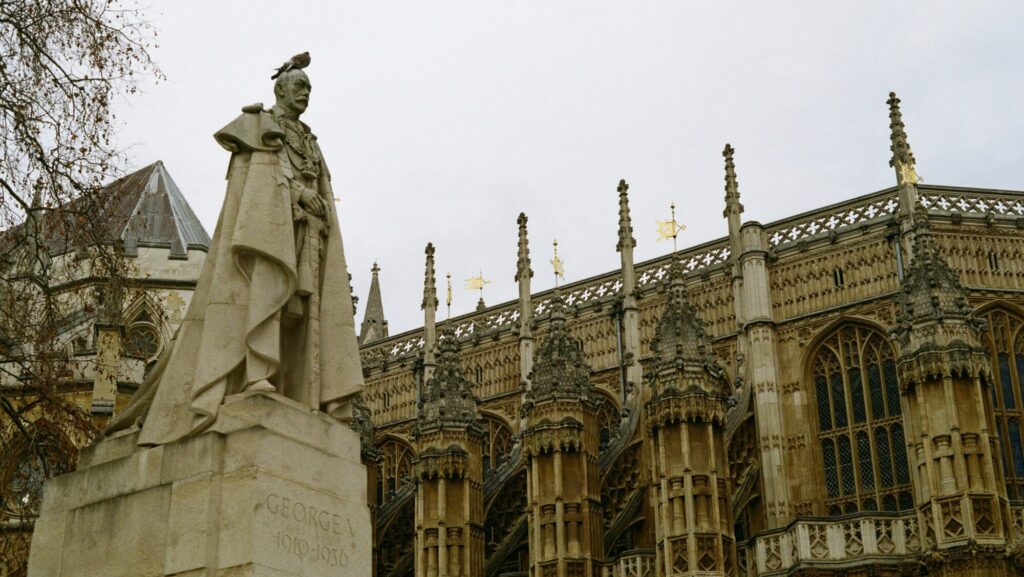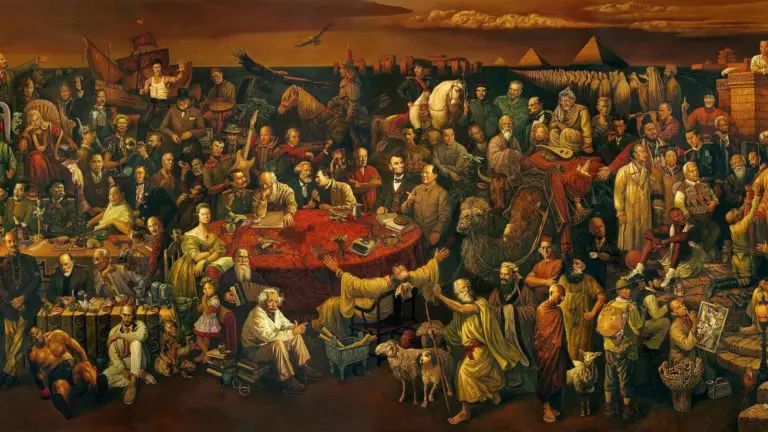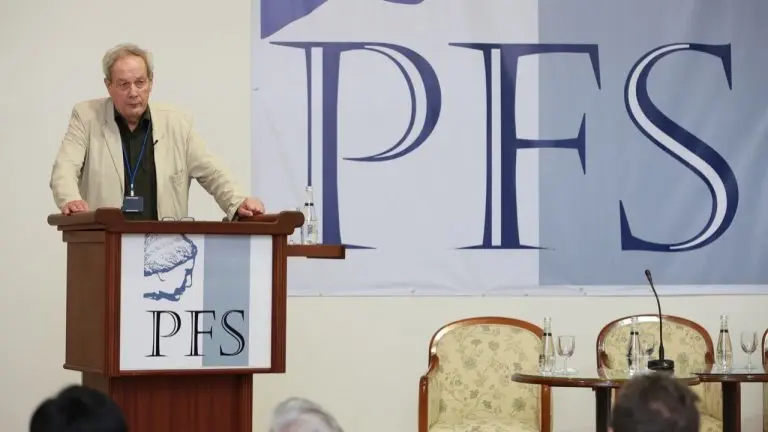Migration is perhaps the most consequential issue of our time. Our world is far more mobile and interconnected than any point in human history and, as a result, we have seen historic demographic shifts and movement of peoples, especially in the Western world. This socio-political trend has become highly charged with emotional and ethical accusations such that those who stand opposed to the current levels of migration are being systematically labelled ‘hateful,’ ‘far-right,’ or ‘bigoted.’ Meanwhile, we are repeatedly told, in what has become trite rationale for unmitigated mass-migration, that ‘love has no borders,’ or indeed—as the Archbishop of Canterbury argued in an Easter Sunday address—that government policies to deter and remove illegal migrants cannot stand the judgement of God.
The political Left, who defend mass-migration and condemn those who argue for stricter migration controls, have to some degree succeeded in framing this political issue in a moral light which favours their position. They have painted their view as one of ‘love’ and ‘compassion.’ After all, it is inconceivable that anyone could turn away a distressed and needy soul from their home. They have convinced our own countrymen that it is a necessary condition of morality to accept millions upon millions of migrants—estranged from our own culture, religion, and heritage—into our homeland. They have bullied those who reject this quasi-moralism by making accusations of racism and hatred, something which has proven an effective strategy for stifling debate and preventing any real political reform.
Yet both the shallow theology of the archbishop, and the quasi-moralism of the so-called progressives, are hollow. For there is a robust moral and theological case to be made against mass-migration, one which should be made stoutly and boldly by conservatives in the face of the vitriol from the Left, and which must be made if we are to turn the tide on what is hastily transforming and degrading the Western world.
When it comes to making the moral case against migration and thinking about our moral obligations to the stranger or foreigner, we must be careful to distinguish between our ethical approach to individual migrants who now live in our country, and migration at the abstract policy level (which entails different, though related, moral concerns). ‘Compassion’ has become the battle cry of the progressives, yet this virtue has been poorly defined and mistakenly applied to the detriment of not only our own native population, but also to those foreigners who seek to settle here.
Compassion for the individual
Brad Littlejohn has argued that the imagery of ‘home’ and ‘hospitality’ are useful in understanding the moral intricacies of the migration debate. To extend hospitality, one must first have a home into which one might welcome the visitor. It must be clear what constitutes the home and what does not, and the head of the household must ultimately keep the priority of his own family as his paramount focus if he is to extend hospitality in the most beneficial and sustainable way. Littlejohn makes the compelling point that one must maintain a proper order of affections. When opening our homes, we must be mindful of our primary duty to our family and children, refraining from allowing dangerous people to enter, yet not battening the hatches so as to snuff out any expression of homely love. Clearly, if our own homes were perpetually open for anyone and everyone to freely help themselves, very quickly there would be nothing homely left and we would have morally failed in our first duty to our own families. This is the case not because strangers are necessarily destructive or evil, but because a well-managed home can only facilitate a certain degree of hospitality without compromising its own integrity. So, too, with the nation. As Littlejohn puts it: “A nation without borders is no better than a house without walls.”
But hospitality is nonetheless a moral good, and it plays an important role in our approach to migration. It is the case, as Matt. 25:35-36 describes, that our service to the hungry, the poor, and indeed the stranger, is as if we served Christ Himself. The example of Christ’s earthly ministry is one which demonstrates his fierce love for every person he meets no matter their standing in society. Yet the Christian scriptures also offer further instruction on the treatment of the ‘sojourner.’ Ancient Israel was given strict commands to not mistreat the sojourners who joined their people (Ex. 22:21, Lev. 19:33) and the psalms speak of the Lord Himself watching over the foreigner (Ps. 146:9). Clearly, if we are to heed these scriptures, it is incumbent upon us, as far as prudence allows, to endeavour to treat the individual strangers we encounter with charity and grace.
However, the Old Testament also exhorts Israel to hold the foreigner to the same legal standard as Israel, with Lev. 24:22 recounting that: “You are to have the same law for the foreigner and the native-born. I am the Lord your God.” Both foreigners and native-born Israelites who blaspheme the name of the Lord are to be put to death (Lev. 24:26), and both foreigner and native-born are to refrain from eating blood (Lev. 17:10). Thus the biblical imperatives to provide welfare for the foreigner are coupled with an expectation that the foreigner is held to the same standards of the law as the native-born—and that they must respect, if not themselves adhere to, Israelite religion and customs. There is a kind of assimilation that is expected, although not a total one, because the distinction between native and foreigner is still maintained, such as between certain groups of foreigners who are not to be admitted into the assembly of God due to their historic mistreatment of Israel, and still others who can be admitted only after three generations (Deut. 23:3-8).
St. Thomas Aquinas provides helpful wisdom on this point. He writes on Scripture’s caution regarding the admittance of foreigners into the assembly of God, saying, “The reason for this was that if foreigners were allowed to meddle with the affairs of a nation as soon as they settled down in its midst, many dangers might occur, since the foreigners not yet having the common good firmly at heart might attempt something hurtful to the people” (ST. I-II, Q.105, Art. 3). Clearly this is an expression of prudence and common sense. It is not the case that all foreign people are likely to wish ill-will upon any place they travel; rather, that strangers are necessarily estranged from the customs, ideas, and heritage of a place not their own. Native-born people are naturally more inclined to preserve the welfare of their homeland, where they have a greater stake in its prosperity. We recognise this intrinsically. For the safety of our children and the protection of our belongings, we are rightly more hesitant about letting the total stranger stay the night in our home compared to our relatives or friends. This kind of prejudice is wise and prudent. In this context, compassion might compel us to invite the stranger for a meal and perhaps even to stay the night once getting to know him better. This would be an exercise of love, but we would surely not be required to give him a key and control of the mortgage!
Thus the orientation of the scriptures does appear to compel the expression of charity, yet it also places obligations on the foreigner in order to protect and preserve the religion and culture of the Israelites. The act of assimilation or integration is perhaps most beautifully depicted in the book of Ruth, in which Ruth (a foreigner) says to Naomi (a native Israelite), in a moving act of loyalty, “Where you go I will go, and where you stay I will stay. Your people shall be my people and your God shall be my God” (Ruth 1:16). The story of Ruth demonstrates the biblical ethic excellently, for it shows not only the stranger adopting the Israelites’ customs and acts of worship, but also the Israelites extending charity in their provision for Ruth and ultimate celebration of her.
At the individual level, the Judeo-Christian ethic would have us extend generous grace and hospitality to those strangers we personally encounter. It would have us heed God’s own particular favour for the foreigner and Christ’s example of consistent charity; yet the biblical narrative would also demonstrate the political and personal need for prudence and would permit us to lay obligations upon the stranger so as not to sacrifice our own customs or way of life. This is, perhaps, a tricky balancing act, and a good case could be made that we ought to lean on the side of charity; yet it is still the case that our compassion and hospitality need not be extended in totality, for prudence’s sake, if we are met with violence, flagrant disrespect, or worse.
Migration at the national level
Compassion is thus an important virtue. However, what is deemed ‘compassionate,’ when it comes to national migration policy entails a whole swathe of different concerns. It is here that the political refusal to seriously limit the current levels of migration, or to deport those who have illegally entered the country, must be challenged. The general premise of the political Left appears to be that the more open our borders, the more compassionate we are. Such an assertion is thoroughly incorrect, for it punishes both those who would seek to come here and respect our laws, as well as the native population to whom the government owes its principal allegiance.
Migration to the United Kingdom has radically changed our country. Since 2012, over 10 million people have migrated to the UK, according to data from the ONS. The 2021 census demonstrated that white Britons were a minority in their own capital city at just over one third of the population compared to the 2001 census, when the same demographic represented around 60% of Londoners. Furthermore, 12% of the total prison population in the UK is made up of foreign nationals and, in 2023, the government spent £8 million a day on housing migrants in hotels.
The drastic increase in the numbers of people moving into the country inevitably places pressure on local and finite resources like housing, and we must be willing to evaluate whether this act of ‘generosity’ is sustainable. Certainly, our ultimate political aim should be a migration system that can truly be called compassionate. Britain has a strong history of being open and tolerant towards people in need, and we should endeavour to further this tradition. Yet, to use the imagery of Littlejohn, while it is the virtue of hospitality which transforms a house into a home, prudence demands we recognise that “revolving-door hospitality would quickly destroy most homes.” For true compassion, one must have the ability to determine exactly who comes through our door; our nation must possess adequate infrastructure in order to extend generosity; and, crucially, our government must heed its primary obligation to our own native people and properly command their trust.
Without a doubt, our leaders have lost control. Successive governments have for years promised drastically to lower migration figures, and they have categorically failed. Since 2020, at least 124,000 people have illegally arrived in the UK, having crossed the English Channel in small boats. Our political elites are unable (or perhaps unwilling) to stop the flow of migration and ensure that only a manageable number of newcomers are allowed entry. For clarity, illegally entering this country is a crime and there is nothing compassionate about failing to prevent crime. The inability to halt illegal migration is an act of political weakness or cowardice; it contradicts the stated intentions of the government, and therefore cannot be deemed an act of love. Furthermore, this political system only serves to incentivise such illegal behaviour by permitting the continued residence of those whose first act upon entering our country is to egregiously break our laws. The increase in illegal migration, and the unwavering political inaction, punishes those would-be-migrants who would seek to move here legally and respectfully, for it reduces the available space to welcome newcomers, rendering us incapable of voluntarily extending generosity to those people genuinely in need across the world. Such toleration also places a tremendous burden upon our own native people who are being forced to share a land with those who have demonstrated profound disrespect, if not outright dislike, for our country and culture by flagrantly breaking our laws. A system which tolerates any level of illegal migration cannot be called compassionate, for it demands our people accept lawbreakers into their neighbourhoods, and it plunders our ability to help those in need who would instead seek to honour our laws.
The lack of political control ensures that we cannot act purposefully. The astronomically high levels of migration over the last few decades now means that Britain does not have the adequate infrastructure, such as housing or public service provisions, to act with sustainable generosity. Our own towns are crumbling, our councils are going bankrupt, homeownership seems like a pipe dream for many, and the pressures on the NHS appear endless and irreversible. Our national home is depleted and, until such a time as we have established order and stability, it is not prudent, wise, or just to continue the open-door policy we have seemingly embraced. The political toleration of mass-migration, legal or illegal, is a major cause of the suffering of our own people, as a result of the high pressure such population increases place upon our own infrastructure, and thus it robs our own people of what is first and foremost their own. However, as significant as the economic and social impacts are, mass migration also presents significant cultural implications.
Preserving heritage
Governments have a moral obligation to serve the interests of their native people and to garner their trust. Any government in any part of the world should be expected to operate in such a way, and the obligation to govern compassionately must be applied to a government’s treatment of its indigenous people. Migration has a transforming impact on a place and, while many do indeed come here and integrate well, too often the impact of mass-migration has resulted in horrendous crime and violence being committed against the native English. Beyond the economic impacts and the increased lawlessness, the mass importation of foreign cultures imperils the continuation of English culture and the English people in their own homeland.
Make no mistake, it is not the case that migrants are necessarily more predisposed to committing crime, nor that those of other peoples or cultures are inferior to the English. It is absurd, though, to deny the differences between peoples and cultures. This is surely the very premise of multiculturalism: that cultures are different yet should all be celebrated and embraced. The problem with multiculturalism is that it is very difficult to embrace and celebrate multiple cultures at the same time, for either one will discover competing values that cannot be reconciled, or else the distinctions between cultures will be eroded and eventually lost. Peoples are moulded by the places in which they reside. The English people are shaped by the English land and tradition; so, too, with other cultures and their homelands. We, today, are inheritors of the religious traditions, cultural norms, and ancestral heritage which have gone before us and which have been practised in public life. In turn, as people, over the course of our public lives, we shape the religious traditions, cultural norms, and the heritage which we pass on to our descendants. There is a multi-directional relationship which is threatened if one’s own culture is suppressed and overwhelmed by an overabundance of others, even if they are not hostile cultures—but especially so if they are hostile or incompatible with one’s own.
This desire to preserve English culture is often attacked as a nativist or xenophobic dog-whistle of the far-right. Yet love of country is a natural good and an example of filial piety which Aquinas compares with the worship of God. He argues that, just as one ought to honour one’s parents in recognition of what one has received from them, and worship God for one’s debt to Him, so also one owes a debt to the country from which one was birthed, granting it one’s pious loyalty (ST. II-II, Q.101, Art 1). There is nothing unnatural about desiring to preserve and uphold one’s heritage and it is simply the case that mass-migration—without any malicious intent being necessarily inferred with regards to the individual migrants—contributes to the dilution and weakening of a homeland’s indigenous cultural heritage. To borrow language from Chesterton, we must be mindful of the “democracy of the dead,” those people who gifted us our nation’s traditions, to whom we would do well to regard with sincerity and gratitude. The political acceptance of mass-migration, and the subsequent cultural upheaval, is a direct assault against those very people and traditions which have been bestowed upon us as our inheritance. In the willing acceptance of such degradation you will find no compassion.
The British Isles are the historic and rightful homeland of the English, the Scots, the Welsh, and the Irish; but they have also become a home to many others who have migrated here lawfully and integrated their lives into the British story. Britain has been able to open her home and extend generosity, and she has been able to offer compassion and demonstrate profound charity. It is good and right that, in our ordinary lives, when we meet those who have migrated here, we extend especial love and charity. Yet it is also the case that, nationally, hospitality has a limit and generosity cannot be extended eternally. The pressures of mass-migration coupled with unprecedented illegal migration make compassion impossible. We simply do not have the capacity to sustainably and responsibly open our home and extend the level of hospitality being currently demanded. To assert otherwise would be a dereliction of duty and a disservice to the nation. Furthermore, there is no moral obligation to surrender our own culture in our own homeland. As a matter of simple fact, migration fundamentally changes the cultural makeup of a place, and mass-migration risks the destruction of our indigenous cultures against the will of the very people our government is supposed to serve.
England is facing demands to give up her Englishness. The political project of mass-migration has opened the floodgates to foreign cultures—frequently with competing and hostile principles—to the detriment of the preservation of the heritage which has formed and been formed by these Isles. In demanding a compassionate migration system, the same moral demands must be applied to the government’s treatment and service of ordinary native people. It is becoming increasingly common to claim the English have no culture, and we are hurtling towards a world where that might become true.






